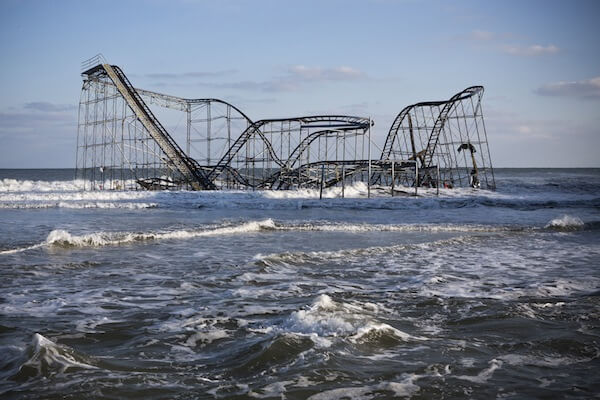Quantifying the Cost of Climate Change Sounds Important, But It’s Not Possible

• It’s impossible to know which storms, droughts, wildfires, etc., are actually caused by climate change (though it’s very clear that the ferocity of these phenomena grows with warming seas and atmosphere).
• Trying to pull apart the effects of climate change from the effects of the fossil fuel consumption that contributes to it is a worthless exercise. Harvard Medical School estimates the healthcare costs associated with breathing the aromatics of coal-fired power plants at $500 billion per year in the U.S. alone, dwarfing the damage to our infrastructure.
• Ocean acidification is in the process of rendering our planet incapable of supporting aquatic animal life. It’s impossible to put a cost on losing such a huge source of protein in the human diet.
• The costs associated with the accelerating rate at which animal and plants species are going extinction is similarly impossible to quantify. Many of the world’s greatest cures for disease were found in nature, and there is no way to tell if the absence of a certain species meant the loss of some vitally important drug.
• Examining the costs to the U.S., which account for about 5% of the world’s population, while ignoring the other 95% makes no sense.
• People are dying, and, while our society ascribes a dollar value to a human life, that’s certainly something that rankles the sensibilities of decent people. Put another way, I doubt Jesus, Socrates, or the Buddha would be comfortable with this idea.
It seems we’re going to have to content ourselves with this summary: the costs of all this are simply too high. The penalty for environmental irresponsibility is far too great, regardless of how or if it’s measured.

Craig,
” our society ascribes a dollar value to a human life, that’s certainly something that rankles the sensibilities of decent people. Put another way, I doubt Jesus, Socrates, or the Buddha would be comfortable with this idea ”
Maybe that’s true, but Jesus, Socrates, or the Buddha don’t have to run a modern economy.
All the myriad benefits of a modern economy come at a cost. Modern transport brings advantages and disadvantages. Huge refrigerated heavy vehicles transport food across vast distances, but the same vehicles not only increase air pollution but by their design are dangerous to themselves and other road users.
Airliners could be made safer, but the cost of fares would be prohibitive.
Everything we build is a compromise between cost and benefit. Your friend Cameron hates and reviles Oil Companies describing them as ‘evil criminals’, yet like many he would be outraged if when he called the fire brigade or an ambulance it was horse drawn !
So many environmentalists get carried away with self righteous sanctimony. Waving a placard in protest when the card board and paint is made from oil has a certain irony. Sanctimoniously gloating EV’s will destroy Oil Companies, is kinda silly when the tyres, electronics, paint, plastics and hundreds of other components (including the black top highway)are all products of the oil industry .
The best we can do is work to mitigate the disadvantages as dispassionately, objectively and effectively as possible.
Demanding Utopia will achieve nothing. The most effective way to help the environment is to prioritize those green products and clean(er)technologies which are feasible and economically viable.
This means choosing practicability over idealism.